Religious Nationalism and the Dimming of Religious Freedom
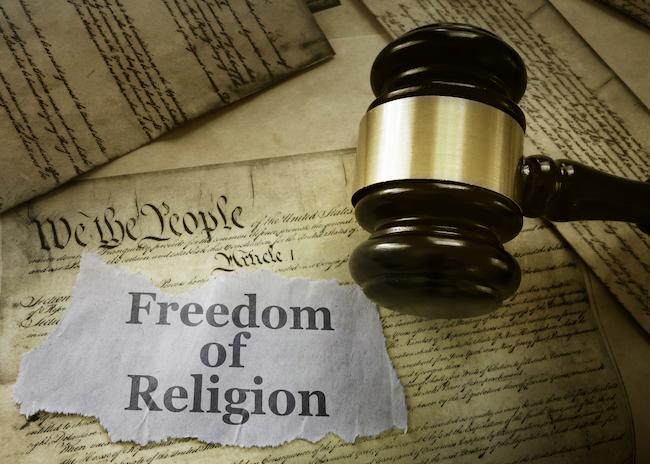
Our 5th Annual Wolfe Lecture on Religion and American Politics
Dr. Stephen Schneck
United States Commission on International Religious Freedom
Date: February 6, 2024
Time: 6 - 7:30pm
Location: Devlin Hall 026
Religious nationalism is surging around the world – in Asia, Africa, Europe, and the Americas, even in the United States. As deployed by authoritarian governments and populist political movements, religious nationalism weaponizes a given religious faith to repress and marginalize the religious rights of minority populations. In so doing, it poses profound challenges to democracy, rule of law, and human rights, and the foundations of modern liberalism. In this talk, Stephen Schneck will present an overview of religious nationalism in several countries around the world (India, Turkey, and Hungary) and identify both the corresponding narrowing of the religious freedom and the worrisome implications for rights and democracy.
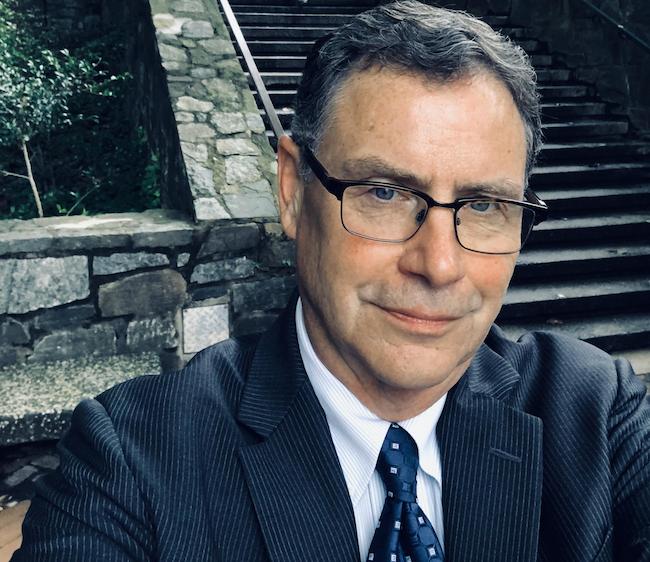
In 2022, Stephen Schneck was appointed last year by President Biden to serve on the United States Commission on International Religious Freedom. His academic work was in political theory and political philosophy. Schneck retired from The Catholic University of America in 2018.
From the speaker, Stephen Schneck:
“Stephen Schneck.” National Catholic Reporter, September 29, 2023. https://www.ncronline.org/authors/stephen-schneck.
Schneck, Stephen. “Amid Pope Francis’ Anniversary, Catholics Need a New ‘Faithful Citizenship.’” National Catholic Reporter, March 20, 2023.
———. “Catholicism and American Political Ideologies: Catholic Social Teaching, Liberalism, and Conservatism by Stephen M. Krason (review).” American Catholic Studies 129, no. 3 (2018): 98–100. https://doi.org/10.1353/acs.2018.0047.
Other Articles and Books:
Cheema, Iqtidar Karamat. Constitutional and Legal Challenges Faced by Religious Minorities in India. Washington, D.C.: U.S. Commission on International Religious Freedom, 2017.
Goalwin, Gregory J. Borders of Belief : Religious Nationalism and the Formation of Identity in Ireland and Turkey. New Brunswick, NJ: Rutgers University Press, 2022.
Omer, Atalia, and Jason A. Springs. Religious Nationalism: A Reference Handbook. Contemporary World Issues series. Santa Barbara, CA: ABC-CLIO, 2013.
Stewart, Katherine. The Power Worshippers: Inside the Dangerous Rise of Religious Nationalism. New York: Bloomsbury Publishing, 2020.
Williams, Rina Verma. Marginalized, Mobilized, Incorporated : Women and Religious Nationalism in Indian Democracy. New York: Oxford University Press, 2023.
Winters, Michael Sean. “Boston College Talk Analyzes Religious Nationalism and Religious Liberty.” National Catholic Reporter. February 9, 2024.
On January 22, 2024, The New York Times published an article describing the Prime Minister of India, Narendra Modi’s recent inauguration of a towering Hindu temple in Ayodhya, a city in northern India. Modi’s actions have empowered Hindu Nationalists, as they believe the temple’s creation represents the “foundation for a Hindu rashtra, or Hindu nation.” Meanwhile, this event has left India’s Muslim minority feeling dispirited, as it signals a further decline in the nation’s religious tolerance. While the temple is only about 70% complete, Modi’s inauguration comes just months before India’s general elections, indicating political support for religious nationalism. The rise of Hindu nationalism in India reflects a larger trend of increasing religious nationalism across the globe.
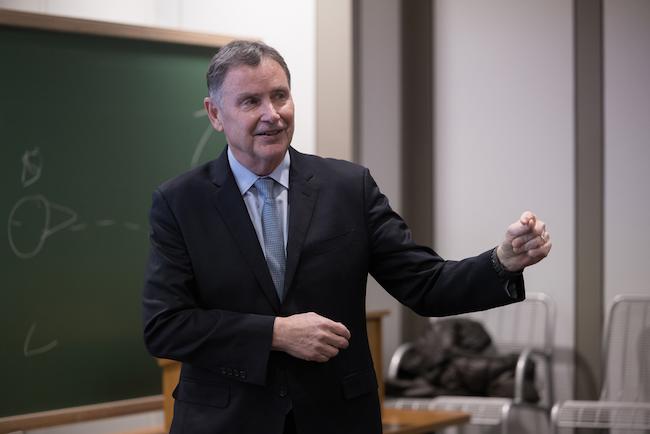
Dr. Stephen Schneck delivering our 5th Annual Wolfe Lecture on Religion and American Politics.
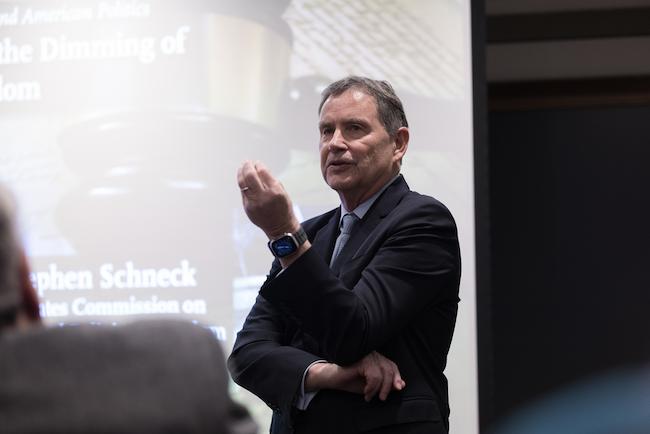
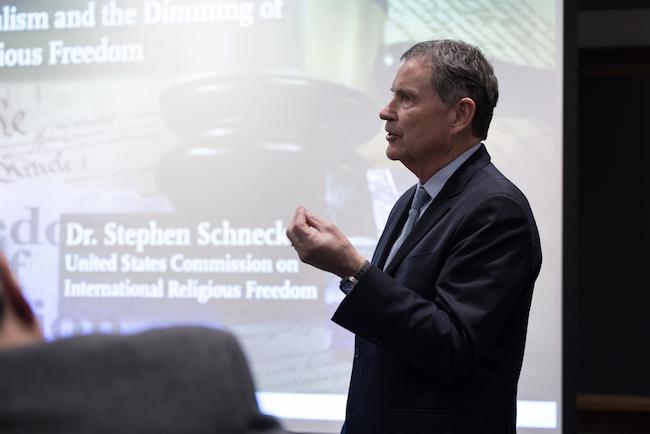
Photo Credits: Christopher Soldt, MTS
On Thursday, February 6th, 2024, the Boisi Center hosted its 5th Annual Wolfe Lecture on Religion and American Politics, titled “Religious Nationalism and the Dimming of Religious Freedom.” Dr. Stephen Schneck, who was appointed by President Biden to serve on the United States Commission on International Religious Freedom (USCIRF), led the event.
Schneck began by articulating the danger of religious nationalism. He shared his experiences serving on USCIRF, where he has witnessed extreme suffering, spoken with victims of religious violence, and been blacklisted from certain countries for advocating for religious liberty. He recounted a trip to Myanmar where he met with Christian refugees living in horrific, heartbreaking conditions after Buddhist nationalists executed a genocide against them. These experiences have contributed to Schneck’s view that we are facing a “global epidemic” of religious nationalism. Throughout the world, there has been an escalation of violence and persecution for individuals and groups believing – and not believing – in certain dogmas. Schneck fears that the proliferation of this violence poses a serious threat to contemporary societies and democracy. He believes that religious freedom is vital to the foundation of liberalism and the existence of human rights.
Schneck then transitioned to an in-depth discussion of the escalation of religious nationalism in India and Hungary. He mentioned how earlier in the month, India’s Prime Minister Narendra Modi dedicated a new Hindu shrine that was built where a mosque used to stand prior to being torn down by Hindu nationalists in the 1990s. Schneck described how Modi’s political party has promoted Hindu nationalism across India, which has led to religious violence towards minority groups. Local and federal Indian government leaders are actively outlawing the traditions and practices of religious minorities, such as banning the wearing of hijabs and interfaith relationships. Schneck noted that a similar crackdown on religious freedom has also been occurring in Hungary. In 2010, Viktor Orbán, a right-wing nationalist, became Hungary’s Prime Minister. Drawing on anti-immigration sentiments, Orbán has employed rhetoric and implemented policies discouraging religious freedom. Although Hungary has had consistently low church attendance rates, Orbán’s leadership has redefined Hungary as a strictly Christian nation, leading many Hungarians to embrace a nominally Christian identity and jeopardizing the security of religious minorities. Schneck contrasted the rise of religious nationalism in India and Hungary, showing the different uses of the tool by right-wing politicians. In India, Hindu nationalism was inherent to the rise of Modi’s party, while in Hungary, it has been a tool used to consolidate political power. Both examples of religious nationalism have resulted in unsafe conditions for religious minorities.
Before transitioning to an engaging question-and-answer portion of the event, Schneck concluded his lecture by urging audience members to join him in the fight to save religious liberty. Given the recent rise of religious nationalism around the world and the grave threat it poses to democracy and human rights, the defense of religious liberty is vital. However, Schneck noted that extreme polarization and the “recent association of religion with the political-right” has prevented “liberal defenders of human rights” from joining this cause. Schneck concluded that we urgently need this to change, as the preservation of religious liberty is vital for the preservation of human rights.

